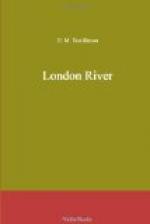The wall space of his room was stratified with shelves, where half-seen bottles and nondescript lumps were to be guessed at, like fossils embedded in shadow. They had never been moved, and they never would be. Hanging from a nail on one shelf was a framed lithograph of the ship Euterpe, off S. Catherine’s Point, July 21, 1849. On the shelf below the picture was a row of books. I never saw Pascoe look at them, and they could have been like the bottles, retained by a careful man because of the notion that some day they would come in handy. Once, when waiting for Pascoe, who was out getting a little beer, I glanced at the volumes, and supposed they bore some relation to the picture of the ship; perhaps once they had been owned by that legendary brother of Pascoe’s, a sailor, of whom I had had a misty apprehension. It would be difficult to say there had been a direct word about him. There were manuals on navigation, seamanship, and ship-building, all of them curiosities, in these later days, rather than expert guides. They were full of marginal notes, and were not so dusty as I had expected to find them. The rest of the books were of journeys in Central America and Mexico: Three Years in Guatemala; The Buried Cities of Yucatan; Scenes on the Mosquito Coast; A Voyage to Honduras. There was more of it, and of that sort. They were by authors long forgotten; but those books, too, looked as though they were often in use. Certainly they could not be classed with the old glue-pots and the lumber.
It was long after my first visit to Pascoe that he referred to those books. “Somebody told me,” he said one evening, while offering me a share of his beer, “that you have been to the American tropics.”
I told him I could say I had been, but little more. I said it was a very big world.
“Yes,” he said, after a pause: “and what a world. Think of those buried cities in Yucatan—lost in the forest, temples and gods and everything. Men and women there, once upon a time, thinking they were a fine people, the only great people, with a king and princesses and priests who made out they knew the mysteries, and what God was up to. And there were processions of girls with fruit and flowers on feast-days, and soldiers in gold armour. All gone, even their big notions. Their god hasn’t got even a name now. Have you ever read the Companions of Columbus?”
I was as surprised as though one of his dim bottles in the shadows had suddenly glowed before my eyes, become magical with moving opalescence. What right had old Pascoe to be staring like that to the land and romance of the Toltecs? I had been under the impression that he read nothing but the Bible and Progress and Poverty. There was a biography of Bradlaugh, too, which he would quote copiously, and his spectacles used fairly to scintillate over that, and his yellow face to acquire a new set of cunning and ironic puckers; for I believe




